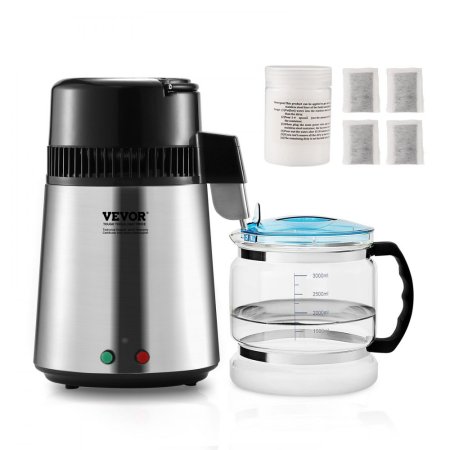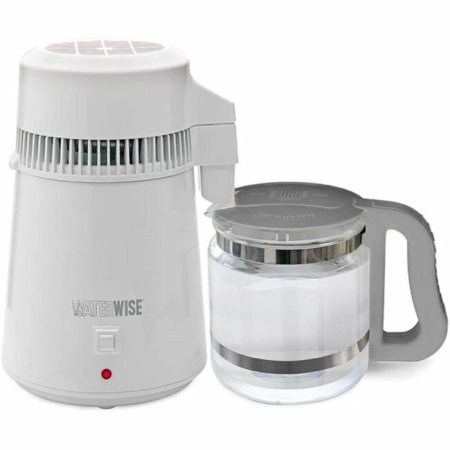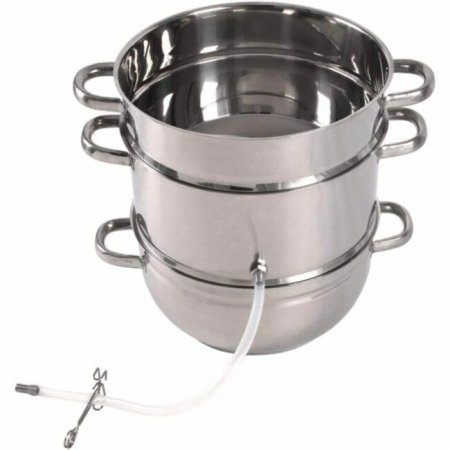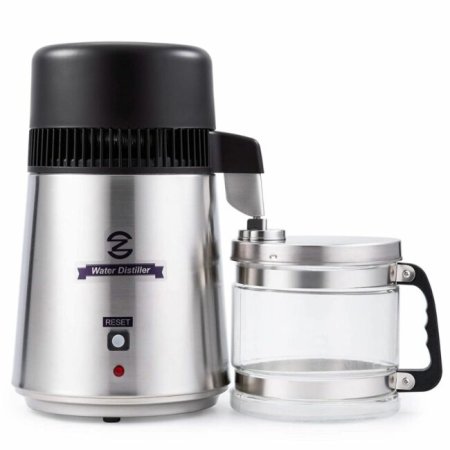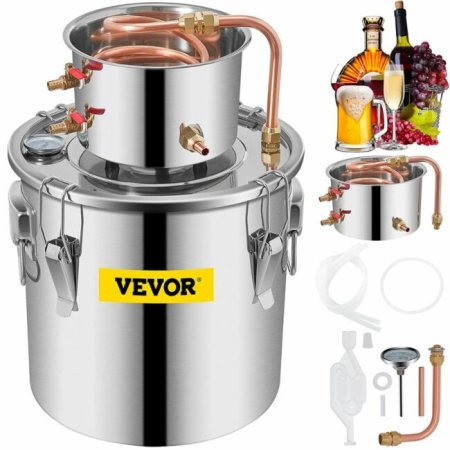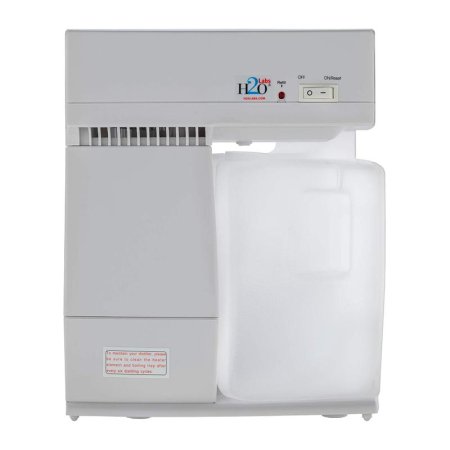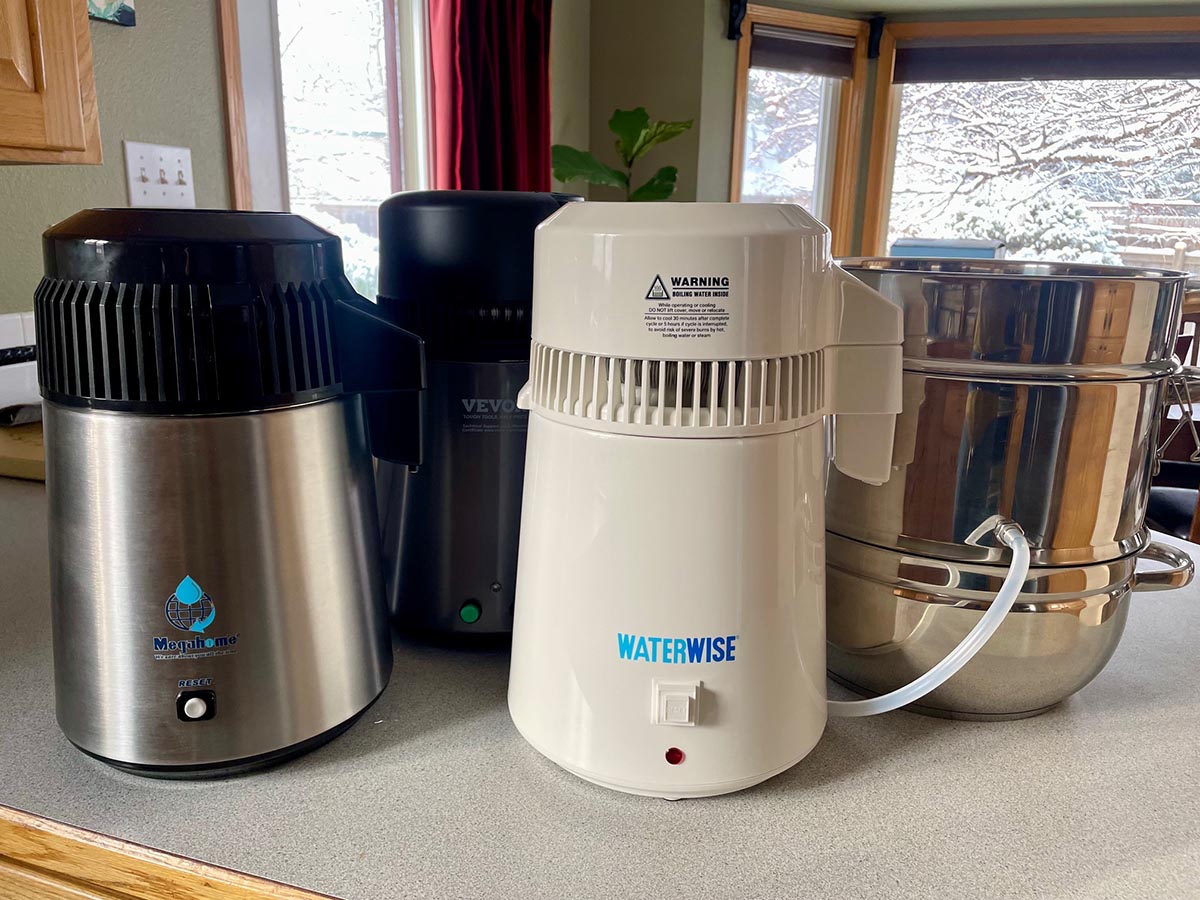
We may earn revenue from the products available on this page and participate in affiliate programs. Learn More ›
Water distillers are effective tools for removing heavy metals, bacteria, viruses, unwanted minerals, and other contaminants from water. These appliances work by heating water until it turns to steam and then condensing it back into pure H2O for drinking, cooking, houseplants, CPAP machines, humidifiers, and more.
While home water distillers all achieve roughly the same end result, they are available in a range of sizes and prices, so it’s hard to know which is best. To help you choose the best water distillation system for your needs, we researched dozens of popular models, tested four top options, and found another three units we also think are excellent. Of all these options, our favorite is the Megahome MH943SBS Stainless Steel Water Distiller for its ease of use, efficacy, build quality, and value.
Whether you’re looking for a countertop water distiller for personal hydration or use in kitchen appliances or home medical equipment, a machine from the following list of the best water distillers is sure to meet your needs.
- BEST OVERALL: Megahome MH943SBS Stainless Steel Water Distiller
↓ Jump to Review - BEST BANG FOR THE BUCK: Vevor 4L Stainless Steel Pure Water Distiller
↓ Jump to Review - BEST PREMIUM: Waterwise 4000 Countertop Distiller
↓ Jump to Review - BEST NONELECTRIC: Kitchen Crop Stainless Steel Water Distiller
↓ Jump to Review - BEST GLASS CARAFE: CO-Z 4L Stainless Steel Countertop Water Distiller
↓ Jump to Review - BEST FOR ALCOHOL: Vevor 12L Stainless Steel Water Alcohol Distiller
↓ Jump to Review - BEST LIGHTWEIGHT: H2o Labs Model 200 Home Water Distiller
↓ Jump to Review
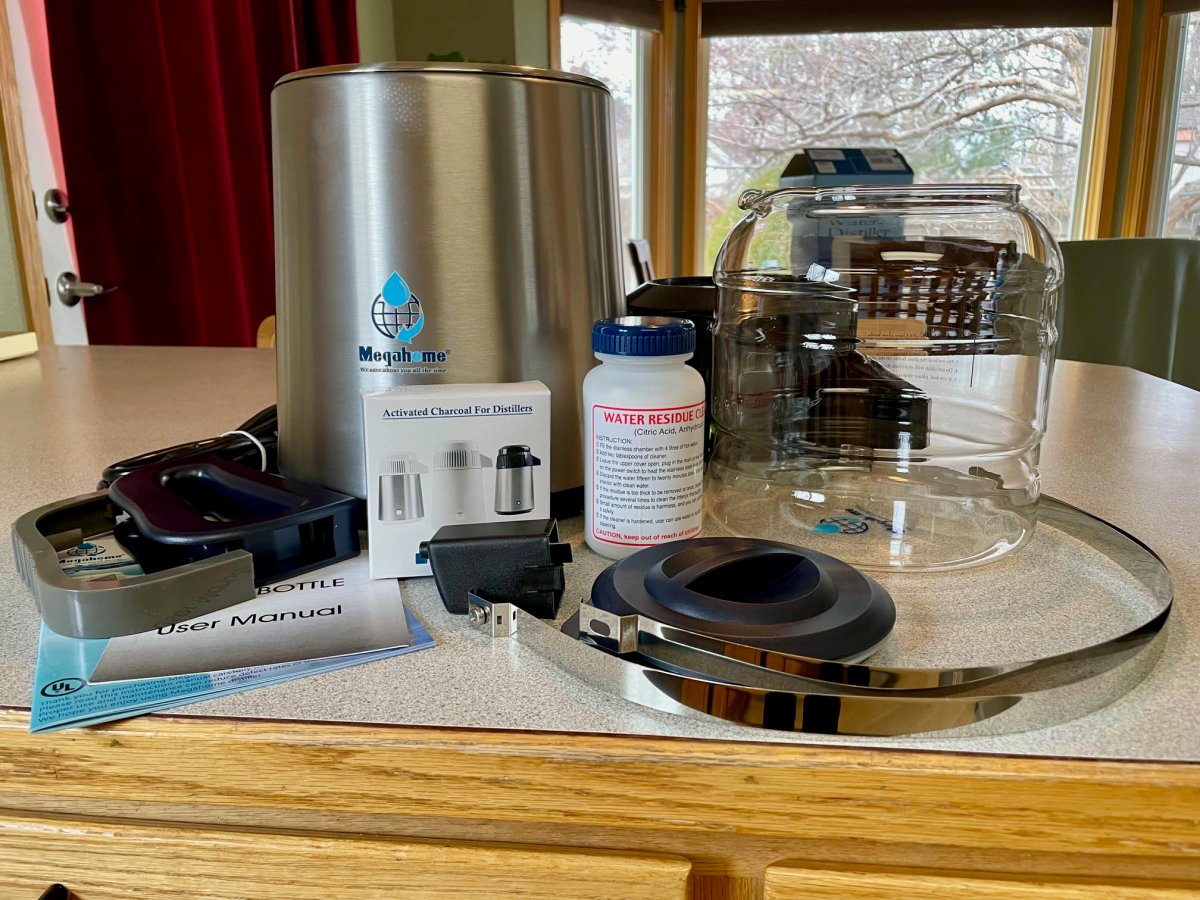
Water Distillers Comparison Chart
| Product Name | Capacity | Speed | Carafe |
| Megahome MH943SBS Stainless Steel Water Distiller | 1.05 gallons | 5.5 hours per gallon | Glass |
| Vevor 4L Stainless Steel Pure Water Distiller | 1.05 gallons | 3.84 hours per gallon | Glass |
| Waterwise 4000 Countertop Distiller | 1 gallon | 4 hours per gallon | Glass |
| Kitchen Crop Stainless Steel Water Distiller | 1.125 gallons | 4 hours per gallon | Stainless steel |
| CO-Z 4L Stainless Steel Countertop Water Distiller | 1.05 gallons | 4 hours per gallon | Glass |
| Vevor 12L Stainless Steel Water Alcohol Distiller | 3.17 gallons | Not listed | Stainless steel |
| H2o Labs Model 200 Home Water Distiller | 1 gallon | 5 hours per gallon | BPA-free polypropylene plastic |
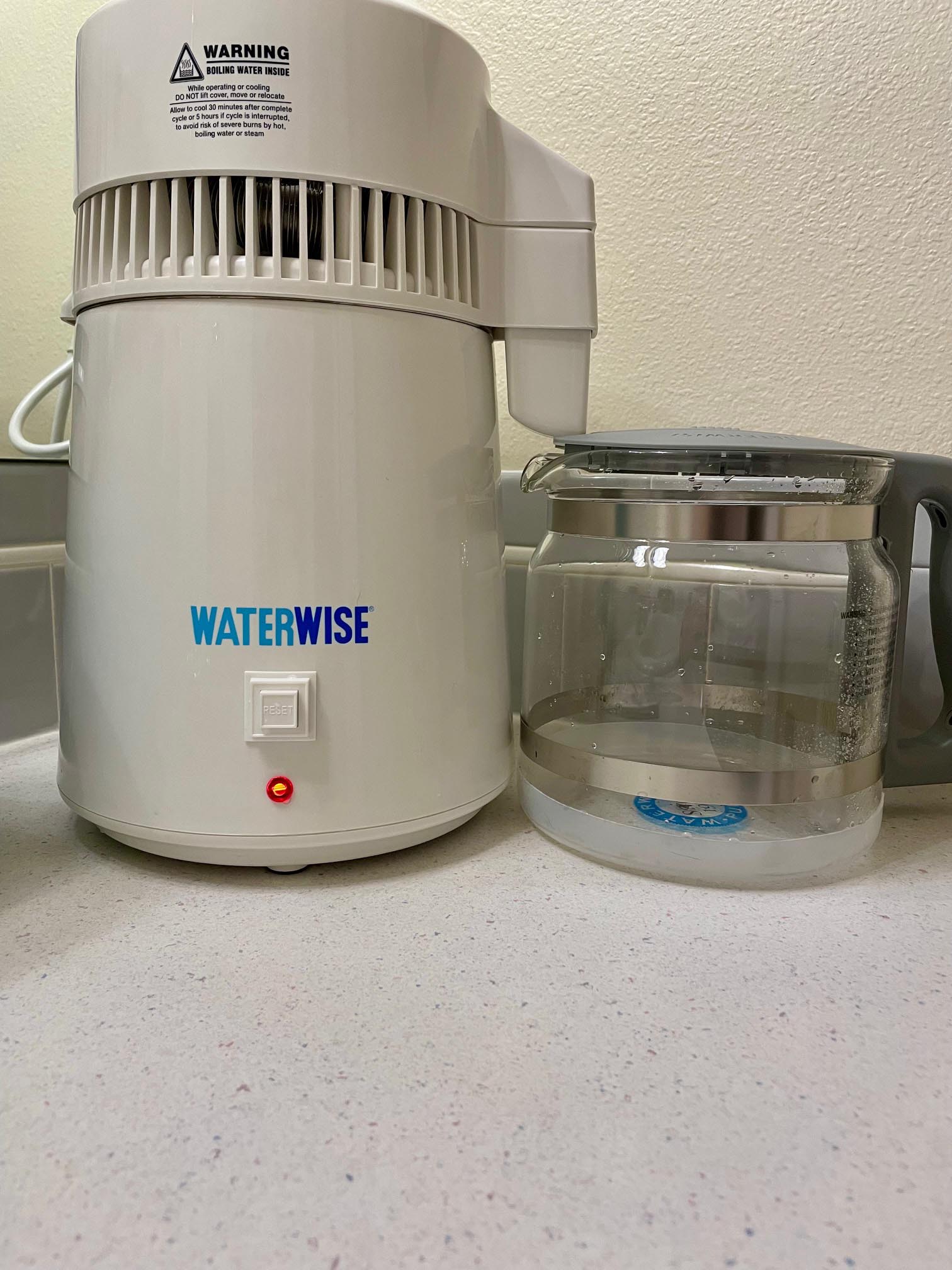
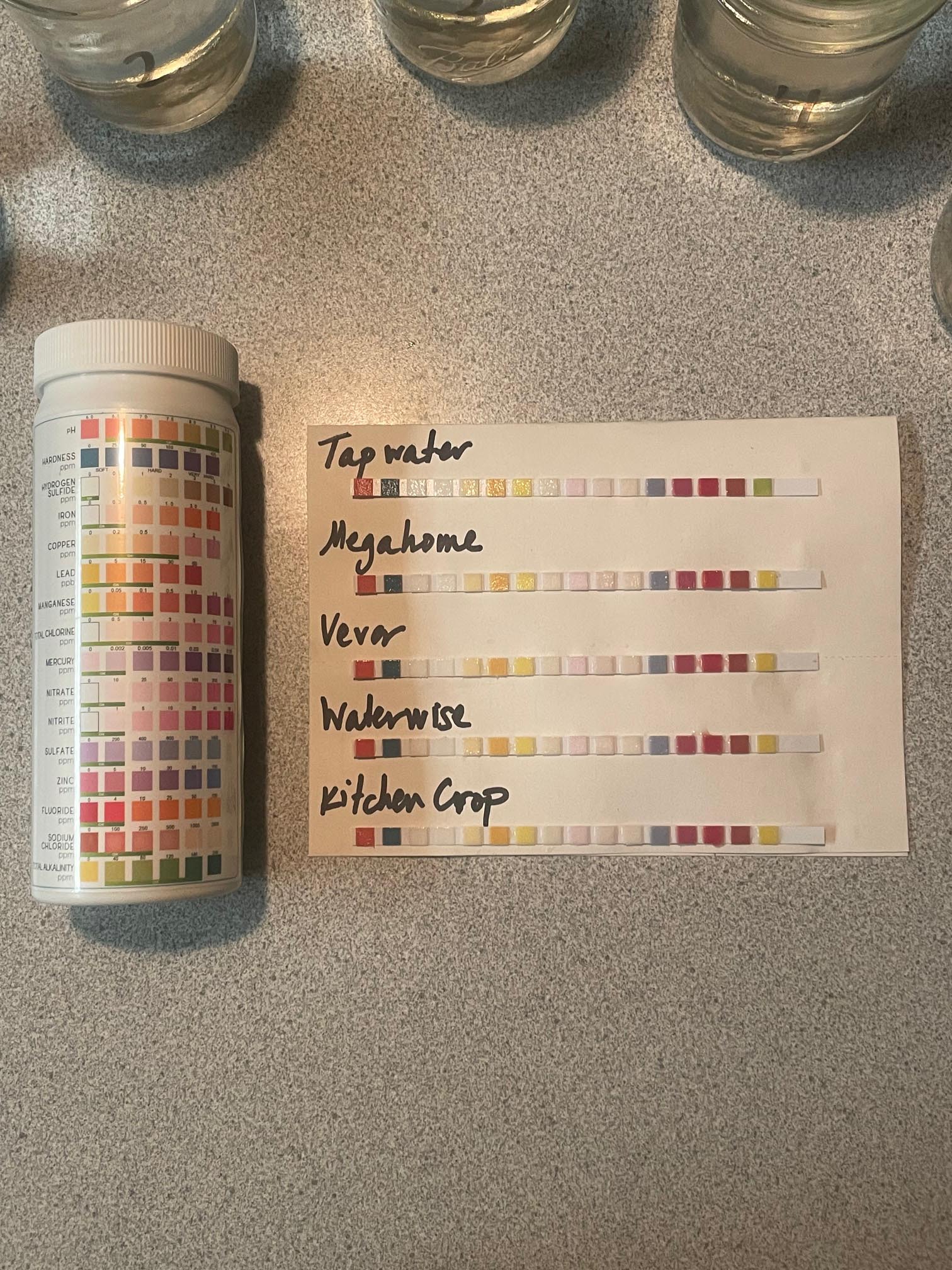
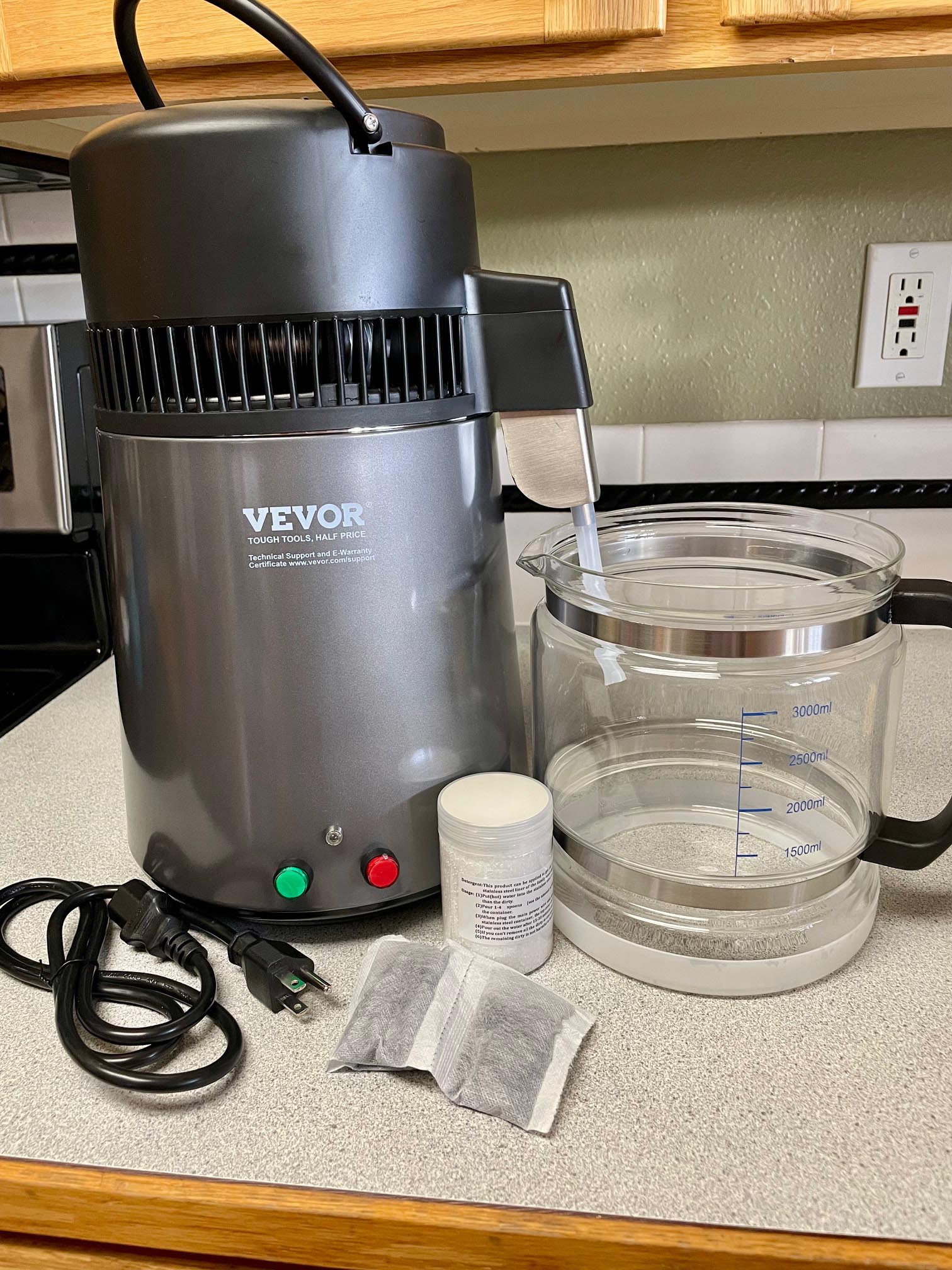
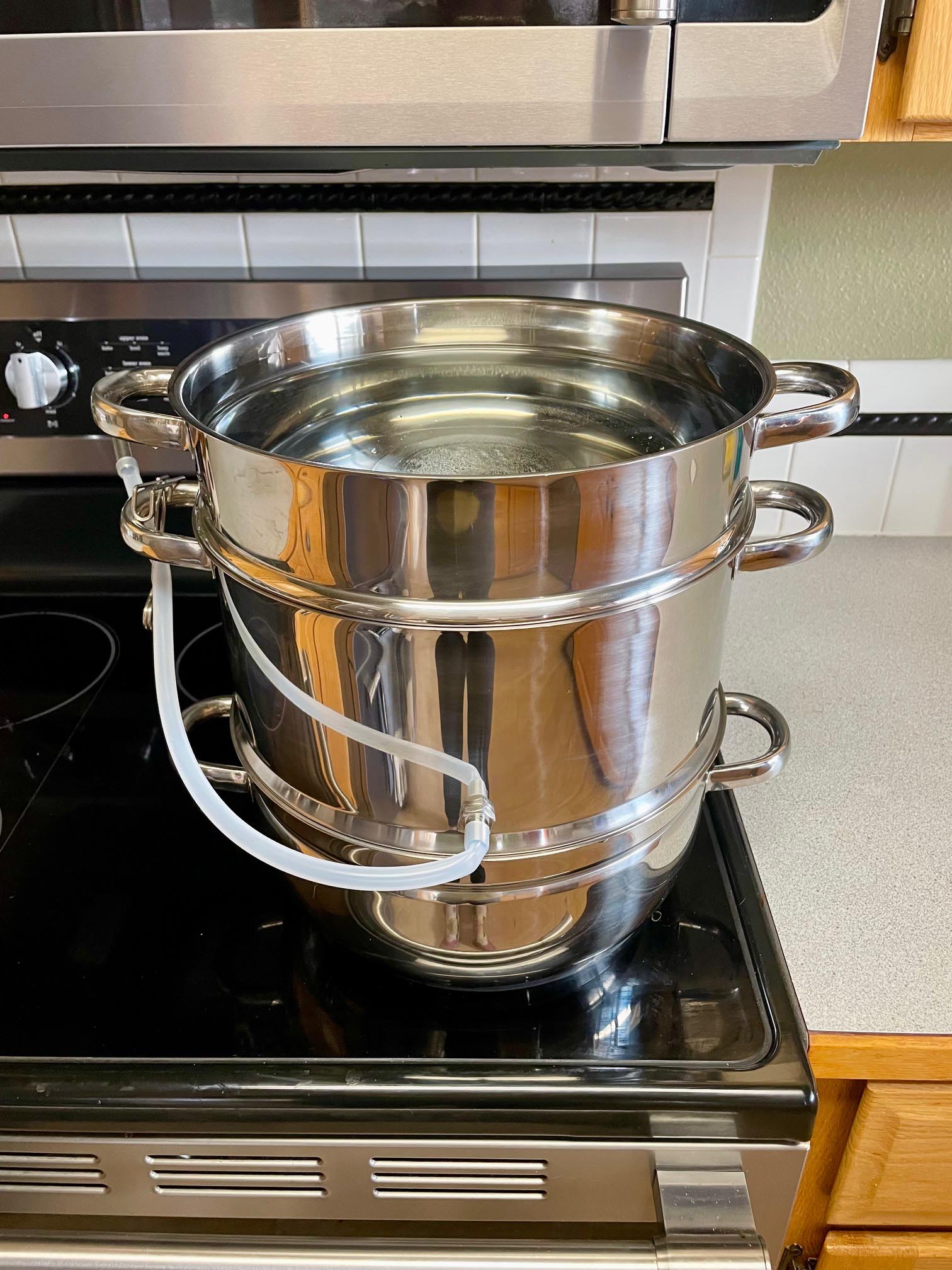
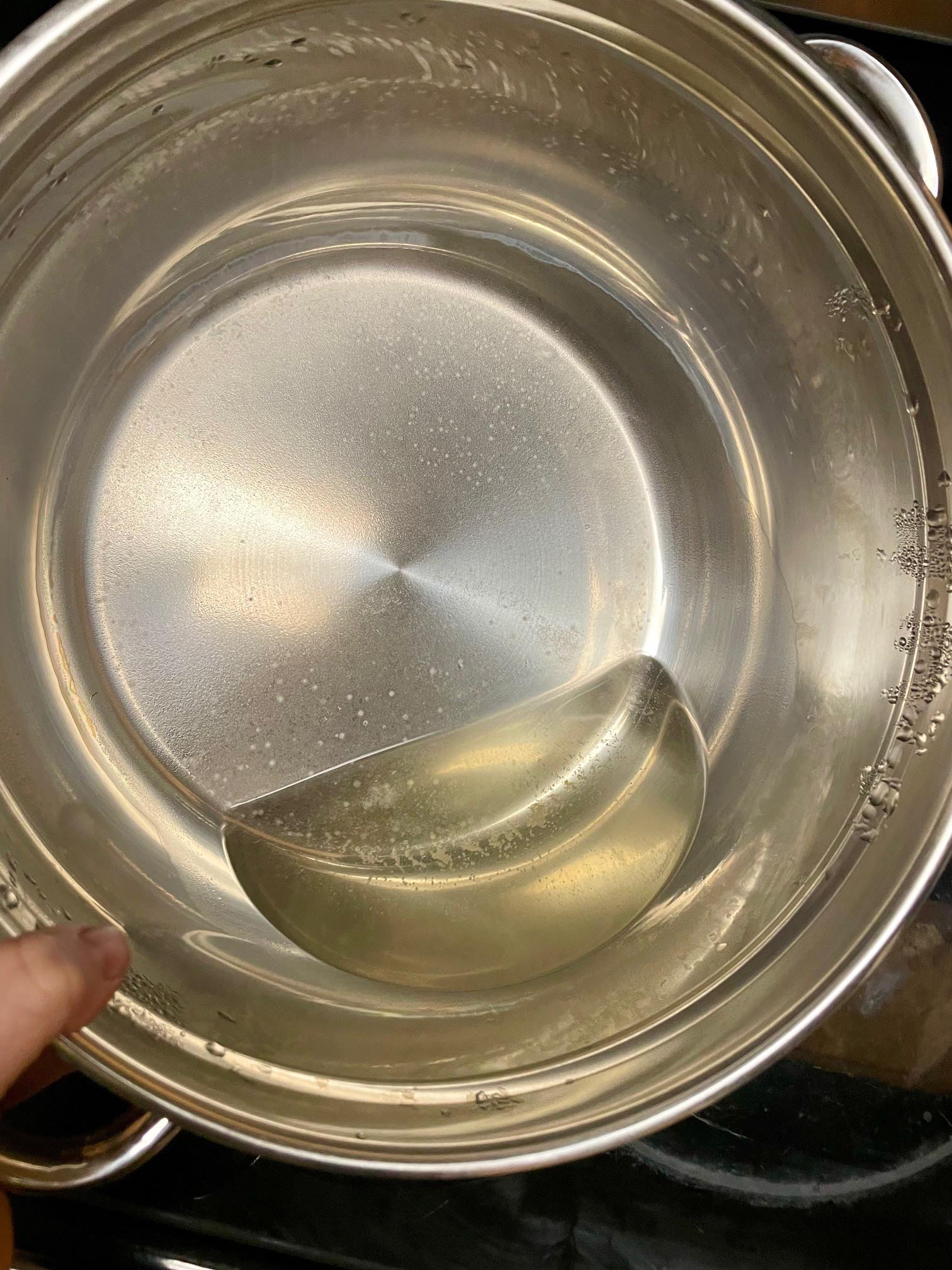
Our Top Picks
We selected some of the best water distillers on the market to help you find the right one for your needs. Read on to see our test results for the top four models and a list of pros and cons for all seven.
Best Overall
Megahome MH943SBS Stainless Steel Water Distiller
What We Like
- Easy to assemble
- Underwriters Laboratory (UL) certified for safety
- 6 charcoal sachets and cleaning granules included
- Lid has silicone seal to keep contaminants out
What We Don’t Like
- Slower than many other options
- Glass carafe doesn’t have protective plastic liner
Specs
- Capacity: 1.05 gallons
- Speed: 5.5 hours per gallon
- Carafe: Glass
Our Ratings: Ease of Use 4.3/5; Taste 5/5; Build Quality 5/5; Value 4.5/5
Most water distillers use electricity to convert water to steam and condense it back to a liquid, yet surprisingly few are UL certified to ensure they meet stringent safety standards. After testing several units and generally feeling a bit uneasy handling water and electricity together, we very much appreciated the peace of mind provided by the UL-listed Megahome distiller. This quality appliance features a stainless steel boiling chamber and condensing coils, and the carafe is food-grade glass, making it safe to use and easy to clean. This construction also means no plastic parts ever touch the water, keeping it free of chemicals.
The Megahome countertop distiller can purify 1 gallon of water in about 6 hours, which is a little slower than some of the other units we tested. Still, its build is excellent, and it’s the only unit that has a silicone seal between the carafe’s lid and body to ensure a tight fit during storage and pouring. This water distiller for home use also comes with a 250-gram bottle of citric acid for easy scale removal.
What our tester says: “I audibly groaned when I saw this carafe needed assembly, having already put together another one that was on the annoying side. Megahome made it easy, though, thanks to stainless steel straps that snap into place, eliminating the need to hold them while screwing on the handle. It’s a small thing, yes, but it’s just another reason this unit earned the top spot.”—Michelle Larson, Product Reviews tester and writer
Get the Megahome water distiller at Amazon or Megahome.
Best Bang for the Buck
Vevor 4L Stainless Steel Pure Water Distiller
What We Like
- Produces excellent water at a great price
- Features on/off buttons for continuous use
- Includes citric acid and 4 charcoal sachets
What We Don’t Like
- Assembly of carafe handle isn’t particularly easy
- Distiller machine handle is potentially unsafe
Specs
- Capacity: 1.05 gallons
- Speed: 3.84 hours per gallon
- Carafe: Glass
Our Ratings: Ease of Use 4.3/5; Taste 5/5; Build Quality 4/5; Value 5/5
Water distillers may require a greater investment than even the best water filters, but they don’t have to break the bank. This Vevor distiller is an affordable option that produces clean, contaminant-free H2O at a fraction of the price of other models. The 750-watt unit can process 0.26 gallons of water per hour, or up to 6.3 gallons per day, making it almost as fast as more expensive distillers.
So why the low price? After testing it, it’s clear the difference isn’t in water taste or purity but likely in design. While it features a quality stainless steel and glass construction like pricier models, assembly is a bit of a pain. Holding the stainless steel straps in place while positioning the handle and turning tiny screws is tricky, especially in such a cramped working area. If you have arthritis or limited patience, this might not be the best choice. The other drawback is the handle on the lid, which is designed for easy lid removal but fooled us into trying to pick the entire machine up when full. Since the boiling chamber and lid are not actually attached but simply fit snugly together, we ended up spilling an entire gallon of water down our cabinets, into its drawers, and all over the floor. Despite these quirks, this machine comes at an almost unbelievably affordable price and will quickly pay for itself.
Get the Vevor water distiller at Lowe’s, Walmart, or Vevor.
Best Premium
Waterwise 4000 Countertop Distiller
What We Like
- High-quality 316 stainless steel boiling chamber
- Charcoal filter lasts longer than other models
- No assembly required
- Glass carafe has protective liner on base
What We Don’t Like
- Comes at a premium price
- Water produced is no better than that of other units
Specs
- Capacity: 1 gallon
- Speed: 4 hours per gallon
- Carafe: Glass
Our Ratings: Ease of Use 5/5; Taste 5/5; Build Quality 5/5; Value 4.6/5
Waterwise’s home distiller may produce the same end product as the rest of the distillers on this list, but it has several design and construction upgrades that warrant its premium price. The unit requires no assembly and comes with two charcoal filters that outlast the sachets included by other brands (60 days or 60 to 80 gallons of water vs. 45 days). It is constructed of 316 stainless steel for increased corrosion resistance (most others are 308), and its glass carafe has a closing lid as well as a protective silicone liner around its base. This sleek, all-white machine also features a convenient automatic safety shutoff.
Waterwise’s distiller holds 1 gallon of water and can purify it in around 4 hours, placing it among the fastest models we tested. Once purified, the water can be used for drinking, CPAP machines, humidifiers, coffee, aquariums, baby formula, and more. While this model is a bit pricey, its durable quality and user-friendly design promise long-term convenience.
Get the Waterwise water distiller at Amazon, Walmart, or Waterwise.
Best Nonelectric
Kitchen Crop Stainless Steel Water Distiller
What We Like
- Non-electric operation for safe water in emergencies
- Works as a double boiler, stock pot, and more
- Dishwasher safe
- Represents an excellent value
What We Don’t Like
- No charcoal filtration; steam distillation only
- Doesn’t come with a collection chamber
Specs
- Capacity: 1.125 gallons
- Speed: 4 hours per gallon
- Carafe: Stainless steel
Our Ratings: Ease of Use 4.7/5; Taste 5/5; Build Quality 5/5; Value 4.6/5
Electric home water distillers may offer convenience, but they’re also among the most expensive tools for purifying H2O. The good news is that a sophisticated appliance isn’t necessary to obtain crystal-clear water. With this stainless steel water distiller from Kitchen Crop, users can purify water on any stovetop or even open flame—no electricity required—making it a great option for emergency or camping situations.
The kit consists of four parts, including three stackable pots for distilling the water and a hose for dispensing it. The pots are made of durable stainless steel, and two of them are typical kitchen pots that can be used together as a double boiler, or separately as a stock pot and bowl. When used as a distiller, the kit can produce a gallon of water in around 4 hours—just as fast as any electric model. Still, this unit requires more monitoring than other options as you don’t want to let the pan run dry. It can also expose you to boiling water and scald-causing steam, so it may not be a great choice in homes with small children.
What our tester says: “After testing so many modern distillers, learning how to operate this one took a minute. Once we figured it out, however, we were impressed to see it’s just as fast as the others and also offers a bunch of other potential uses. It’s also super easy to clean.”—Michelle Larson, Product Reviews tester and writer
Get the Kitchen Crop water distiller at Amazon or Kitchen Crop.
More Great Options
While we haven’t tested these next three models just yet, we couldn’t help but include them. Each distilled water system is highly rated for a range of household uses, and one can even distill homemade spirits.
Best Glass Carafe
CO-Z 4L Stainless Steel Countertop Water Distiller
What We Like
- Nonslip base helps prevent accidents
- Comes with cleaning granules to remove limescale
- UL certified for safety
What We Don’t Like
- Water sometimes runs around the filter instead of through
- 304 stainless steel isn’t as durable
Specs
- Capacity: 1.05 gallons
- Speed: 4 hours per gallon
- Carafe: Glass
This 1-gallon water distiller machine from CO-Z is fast, easy to use, and a surprising value thanks to its quality and price. The appliance can purify a gallon of water every 4 hours, removing all kinds of harmful bacteria and toxins through its distillation process. On top of that, it also includes an activated carbon filter that sifts the water after it’s distilled, eliminating any leftover VOCs. Just be sure you have the drip compartment installed properly so water flows through the filter rather than around it.
One of the best parts of this distiller is its glass carafe, which doubles as a collection reservoir and storage container. Its ergonomic handle makes pouring from the carafe easy, though you will need a screwdriver to attach the large handle before use.
Get the CO-Z water distiller at Amazon, Wayfair, or CO-Z.
Best for Alcohol
Vevor 12L Stainless Steel Water Alcohol Distiller
What We Like
- Works for water as well as alcohol
- Also available in 5- and 9.6-gallon boiler sizes
- Very affordable compared to other models
What We Don’t Like
- Not as easy to use as an electric water distiller
- Requires an open flame as a heat source
Specs
- Capacity: .92 gallon
- Speed: Not listed
- Carafe: Stainless steel
Distillers aren’t just for purifying drinking water—they can also be used to produce alcohol. Alcohol distillation involves boiling fermented raw materials over high heat to release alcoholic vapor, which is then condensed into liquid form. This kit from Vevor makes this interesting but potentially messy process smooth and efficient.
The Vevor alcohol still contains everything needed to distill water, liquor, or even essential oils at home. Its 3.17-gallon stainless steel pot serves as the boiling chamber, and it also has a smaller .92-gallon receiver attached to a cooling copper coil that functions as a carafe. The pot also includes a built-in thermometer for easy temperature monitoring throughout the distillation process.
Get the Vevor alcohol distiller at Amazon or Vevor.
Best Lightweight
H2o Labs Model 200 Home Water Distiller
What We Like
- Lightweight design is easy to lift
- Boiling tray is dishwasher safe
- Automatic shutoff increases safety
What We Don’t Like
- Can only distill 4 gallons of water per day
- May not last as long as steel and glass distillers
Specs
- Capacity: 1 gallon
- Speed: 5 hours per gallon
- Carafe: BPA-free polypropylene plastic
With a 600-watt heating element, the H2O Labs Model 200 home water distiller purifies water without sucking up a lot of energy. This is the only distiller on our list that uses a BPA-free plastic collection chamber that doubles as an easy-fill reservoir so you can keep the main unit (the heavy part) on the counter during refilling. While its plastic construction may not last as long as a stainless steel and glass machine, it is lighter and easier to clean, making it ideal for seniors and those not wanting to lift anything heavy.
Another unique feature of this distiller is its dishwasher-safe thermoplastic boiling tray. This stick-resistant tray helps prevent scale buildup, meaning the machine only requires complete cleaning approximately every six cycles. It also has an automatic shutoff for safety and convenience.
Get the H2o Labs water distiller at Amazon or H2o Labs.
Jump to Our Top Picks
How We Chose and Tested the Best Water Distillers
| Testing Stats | |
|---|---|
| Products tested | 4 |
| Time spent testing | 39 hours |
| Tests performed | 5 |
| Price range | $75 to $400 |
Choosing water distillers to test and include in this guide wasn’t easy. There are hundreds of models available that all look quite similar yet vary widely in terms of popularity and price. After extensive research, we chose four top options to test, selecting models with unique features available at a range of prices.
Each unit except one required some degree of assembly, and all needed initial cleaning plus a preliminary cycle to remove any remaining residue from manufacturing or packaging. Once they were clean, we timed how long it took to run a full cycle through each machine, tested the output using the Varify Complete Drinking Water Test Kit from our best water test kit guide, and performed a blind taste test. We cleaned each machine between uses and applied included granules (or vinegar if no granules were included) to see how easy it was to remove any built-up scale once all tests were complete.
| Product Name | Ease of Use | Taste | Build Quality | Value |
| Megahome MH943SBS Stainless Steel Water Distiller | 4.3 | 5 | 5 | 4.5 |
| Vevor 4L Stainless Steel Pure Water Distiller | 4.3 | 5 | 4 | 5 |
| Waterwise 4000 Countertop Distiller | 5 | 5 | 5 | 4.6 |
| Kitchen Crop Stainless Steel Water Distiller | 4.7 | 5 | 5 | 4.6 |
What to Consider When Choosing a Water Distiller
Most distilled water machine models share a similar design, consisting of a heating element that steams and dispenses the water and a carafe or pitcher that catches it. Knowing what makes each option different from another is key to choosing the one that will meet your needs.
Type
Unlike the variety available for more traditional water filters, including countertop filters and plumb-in water filtration systems, the best water distillers all share a relatively similar design. Most models we tested consist of two main parts: the boiling chamber, which heats and cools the water, and the carafe or pitcher, which collects it for drinking. Some distillers also incorporate internal filters to further clean the water of any contaminants after the distillation process.
Alternatively, some distillers may feature a more rudimentary design, consisting of large pots you fill with water and heat over the stove. These kits are sometimes marketed as emergency essentials or tools for alcohol distillation, but you can also use them to make distilled water for babies, plants, appliances, cooking, and drinking.
Capacity and Speed
For everyday household users, a water distiller’s two most important features are capacity and speed. While water distillers operate more slowly than regular water filters, which do not have to heat and cool the water, it’s still nice if they work quickly and efficiently. The right water distiller should also hold enough water to hydrate the entire household, whether it consists of just one person or a whole family.
Since smaller machines generally produce smaller quantities within a full distilled water filtration cycle, they may be best for purifying just one person’s daily hydration requirements. Large units are often slower since they have more water to process, but their size may make them better suited to multimember households.
Materials
Water distillers are designed to produce pure, contaminant-free H2O, and the material construction and quality of these appliances can ultimately impact that purity. For example, some plastics contain BPAs and other chemicals that can leach into the water after cleaning, so finding a distiller free of those toxins is important.
Generally speaking, a distiller made from stainless steel and a carafe constructed using glass will not only be the safest option but also the easiest to clean and maintain. Still, glass carafes may get broken, so accident-prone individuals or households with small children may be better off with BPA-free plastic carafes.
Filtration
Water distillers work by boiling water and releasing it as steam, which the machine then cools and condenses into pure H2O. Because the vast majority of chemicals and contaminants are left behind when the water evaporates, there are some distilled water benefits created by using these machines, including the elimination of common water problems like the presence of bacteria, viruses, and other toxins.
As with other types of filters like gravity water filters, many water distillers also use charcoal to remove additional contaminants. Since volatile organic compounds (VOCs) can exist in a gaseous state and survive the distillation process, running the water through an activated-carbon post filter further purifies it.
Be aware, however, that while distillation may effectively remove toxins from tap water, the process can also strip it of certain minerals that contribute to health. For this reason, some users add remineralization drops to distilled water to replace healthy minerals that are lost. A normal distilled water pH level is 7, falling right in the middle of the range recommended by the U.S. Environmental Protection Agency.
Energy Consumption
Depending on their size, water distillers can vary in terms of energy consumption. Water distillers designed for use in the U.S. will run off of a standard 110 or 120 volts, the same as most household appliances. In terms of energy consumption, a medium-sized water distiller consumes around the same amount as a small drip coffee maker—somewhere between 500 and 800 watts.
To improve their energy efficiency, many water distillers include automatic shut-off features that keep them from sucking up energy when not actively distilling water.
Certification
While there is no universal certification standard for water distillers, the most reputable models will often carry approval from Underwriters Laboratories (UL), a nonprofit organization that vets the safety and quality of small appliances and products. A UL certification ensures that a water distiller has been tested and conforms to industry-wide safety and quality standards.
The Advantages of Owning a Water Distiller
Although most tap water in America is deemed safe to drink, that doesn’t mean it’s healthy. The U.S. Environmental Protection Agency’s drinking water regulations set legal limits on more than 90 contaminants found in tap water, from viruses and bacteria to chemicals like fluoride and lead. However, some trace amounts of these impurities can still make their way into our drinking water, negatively impacting our long-term health.
A water distiller is one of the most effective ways to ensure you’re drinking the purest water possible. Unlike a faucet water filter, reverse osmosis machine, or water cooler, a distiller removes harmful chemicals through evaporation and condensation, resulting in purer H2O. By stripping these impurities, a distiller can produce contaminant-free water but also H2O that tastes and smells better.
Making your own distilled water is also a more economical choice in the long run. Though distillers require an up-front investment, they can save users from having to repeatedly buy distilled bottled water for drinking or other uses, such as in a humidifier, CPAP machine, or baby formula. Accounting for energy costs, many distillers can produce pure water at less than 25 cents per gallon.
- Drinking distilled water can be healthier than tap water.
- Water distillers produce purer H2O than filters or reverse osmosis.
- Distilling water is cheaper than buying it.
Tips for Cleaning a Water Distiller
Regular cleaning and maintenance is essential to keeping a distiller operating effectively. This is especially true for the distiller’s boiling chamber, which can become covered in heavy-metal scale and other impurities left behind during the distillation process. If left uncleaned, this scale can corrode the inside of the chamber, ruining the appliance.
Cleaning methods may vary from model to model, but most water distillers only require a gentle hand wash between uses. (We also dried all stainless steel components to prevent spotting during our tests.) If there is excess limescale buildup in the chamber, the unit may need to be soaked for a few hours in a cleaning solution or diluted vinegar. Many of the distillers in this list come with citric acid granules to help break down residue and buildup inside the chamber.
When in doubt, consult the distilled water brands’ instructions for tips on cleaning the distiller.
- For best results, water distillers should be cleaned often—ideally between uses.
- Pay special attention to the buildup of heavy-metal scale in the boiling chamber. Removing this is key to preventing rust and maintaining metal.
- Some distillers may include special cleaning products to break down excess scale.
- If no cleaning product is included, diluted vinegar can help remove mineral buildup.
FAQs
Still wondering how to choose a water distiller? Keep reading for frequently asked questions about these appliances, from filters to water shelf life.
Distilled water is made through the process of distillation. Essentially, it’s the same process that rainwater goes through during the Earth’s natural water cycle. Specifically, water is heated until it turns into steam and then cooled until it condenses back into liquid.
Distilled water isn’t just for drinking. Other distilled water uses include filling household appliances like humidifiers, steam irons, or CPAP devices. You can also use it for plants, cooking, coffee and tea, baby formula, and other uses where the purity of the water is important and where mineralization or scale buildup can be a problem.
If left sealed in a glass or plastic container, distilled water can last for several years. When opened, it’s best to consume it or use it within a few months.
While the distillation process removes most impurities from water, some contaminants—such as harmful VOCs—can survive. A post-carbon filter is designed to catch any stray chemicals or VOCs that make it through distillation.
For those needing distilled water for any of the uses mentioned above, these machines can easily pay for themselves over time, making them well worth their cost.
The main disadvantage of a water distiller is that it can remove the presence of some healthy minerals. Adding remineralization drops or simply eating a healthy diet can replace these lost minerals, eliminating this issue.
Distilled water is water that has been boiled to remove contaminants and then condensed back into a liquid. This purifies the water, eliminating bacteria, viruses, and other toxins. The pH level of distilled water is 7—neither acid nor alkaline.
Meet the Tester
To know Michelle Larson is to know her water bottle collection. Thanks to an ongoing supply of trace mineral drops and four of her favorite water distillers, the answer to her daughter’s and husband’s consistent query of “Do you have water?” is always “Yes.” Between sips, you can find Michelle writing about health and home tools or out on a trail testing hiking boots.
Additional research provided by Chase Brush.




